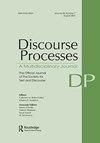家庭在移民史数据讨论中的话语实践
IF 2.1
2区 心理学
Q2 PSYCHOLOGY, EDUCATIONAL
引用次数: 0
摘要
摘要大规模数据和数据可视化现在在塑造我们社会的故事中无处不在。特别是,这些故事影响了青年和家庭对科学、社会和个人问题的沟通和理解。因此,我们需要更好地了解青年和家庭如何利用产生这种叙事的工具进行参与和学习。本研究报告了对13个家庭数据讨论的定性分析,这些家庭使用数据可视化工具来探索与其家庭迁移历史相关的地理参考数据。我们根据家庭案例开发了共建、情境、推进理论(CSAT)模型,该模型详细描述了家庭根据数据显示讲述个人故事的话语和互动过程。我们的模型扩展了早期关于讲故事作为家庭对话理论构建的研究,提供了对家庭围绕数据探索的话语实践的理解。我们讨论了数据技术对家庭学习的影响。本文章由计算机程序翻译,如有差异,请以英文原文为准。
Families’ discursive practices in data discussions about migration histories
ABSTRACT Large-scale data and data visualizations are ubiquitous now in the stories that shape our society. In particular, these stories influence youth and families’ communication and understanding of scientific, social, and personal issues. Consequently, we need to better understand how youth and families can engage and learn with the tools that generate such narratives. This study reports on a qualitative analysis of 13 data discussions with families that used data visualization tools to explore georeferenced data connected to their family migration histories. We developed the Co-Construct, Situate, Advance a Theory (CSAT) model, from family cases, which details the discursive and interactional processes by which families tell personal stories grounded in data displays. Extending earlier studies of storytelling as theory-building in family conversations, our model provides an understanding of families’ discursive practices around data exploration. We discuss implications for family learning with data technologies.
求助全文
通过发布文献求助,成功后即可免费获取论文全文。
去求助
来源期刊

Discourse Processes
Multiple-
CiteScore
4.30
自引率
4.50%
发文量
27
期刊介绍:
Discourse Processes is a multidisciplinary journal providing a forum for cross-fertilization of ideas from diverse disciplines sharing a common interest in discourse--prose comprehension and recall, dialogue analysis, text grammar construction, computer simulation of natural language, cross-cultural comparisons of communicative competence, or related topics. The problems posed by multisentence contexts and the methods required to investigate them, although not always unique to discourse, are sufficiently distinct so as to require an organized mode of scientific interaction made possible through the journal.
 求助内容:
求助内容: 应助结果提醒方式:
应助结果提醒方式:


